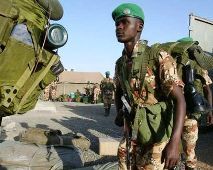Darfur observers face logistics nightmare monitoring area the size of France
EL FASHER, Sudan, Aug 29 (AFP) — Monitoring military activity in a vast desert region the size of France would pose enormous problems for the best equipped team but for the African Union ceasefire commission in Darfur it is a logistics nightmare.
 The commission’s chief military observer, Colonel Anthony Amadoh, says he has grown used to the region’s blazing heat, but he has to patrol the arid wastes of western Sudan with just three helicopters, 35 vehicles and 133 military observers in the full glare of the international spotlight.
The commission’s chief military observer, Colonel Anthony Amadoh, says he has grown used to the region’s blazing heat, but he has to patrol the arid wastes of western Sudan with just three helicopters, 35 vehicles and 133 military observers in the full glare of the international spotlight.
On top of that, the region has next to no metalled roads, few landlines and no mobile telephones at all outside the three main towns.
The logistics are “very poor,” says Amadoh, stealing a glance at the handful of vehicles parked outside his office tucked away on the western outskirts of the North Darfur state capital of El Fasher.
“We conduct our patrols by land or air,” he explains, adding: “We do not have enough vehicles and we used to have only two choppers.”
The commission has divided its area of operation into six sectors covering the three states of Darfur and the Abeche region of neighbouring Chad, where some 200,000 of the more than 1.2 million people displaced by the conflict have taken refuge.
Each sector has two teams of between seven and 10 members, and they must all share the 35 vehicles and three helicopters.
Many institutions, including the European Commission, have pledged funds to support the operations of the mission but only a fraction of that help has actually arrived.
“The timelines are not being met,” Amadoh complains.
Good roads are almost non-existent, increasing the chances of vehicle breakdown, which in turns puts additional pressure on the remaining fleet.
The observers must also bring in fuel from El Obeid in North Kordofan state far to the east. The supplies often “take up to four days to arrive” in special military escorted convoys, says Amadoh.
Communications too continue to be a major problem. There are only a handful of land lines in the main towns and the mobile phone services that exist in the big towns of El Fasher, Nyala and Gineina are irregular at best.
Amadoh consults a dossier on the table next to him and pulls out a manuscript document.
“We used to get all our reports in this form,” he says, pointing to the barely decipherable handwriting. “Now we have been able to buy some laptops.”
But that does not eliminate all the problems in the absence of any Internet services.
The confidential nature of the reports means it may not be entirely safe to ship them to headquarters by land so air transport is often a necessity.
“They have to wait until a chopper goes there,” says Amadoh. And there are only three helicopters to ferry the observers on missions at short notice as well as doubling up as couriers.
Amadoh also has difficulties deploying the more than 150 Rwandan troops dispatched to the region to provide protection for the observer teams, as there are simply not enough vehicles to go around.
With such constraints, it is all too easy for the observers to miss alleged attacks like that on the village of Yassin which prompted the walkout of the Darfur rebels from peace talks with the government in the Nigerian capital on Saturday.
The village, where the rebels say 64 civilians were killed by government forces on Wednesday, is close to the South Darfur state capital of Nyala, but even there it is difficult for the observer mission to be constantly on the ground.
All it can do is follow up the allegations afterwards to test Khartoum’s denials.
